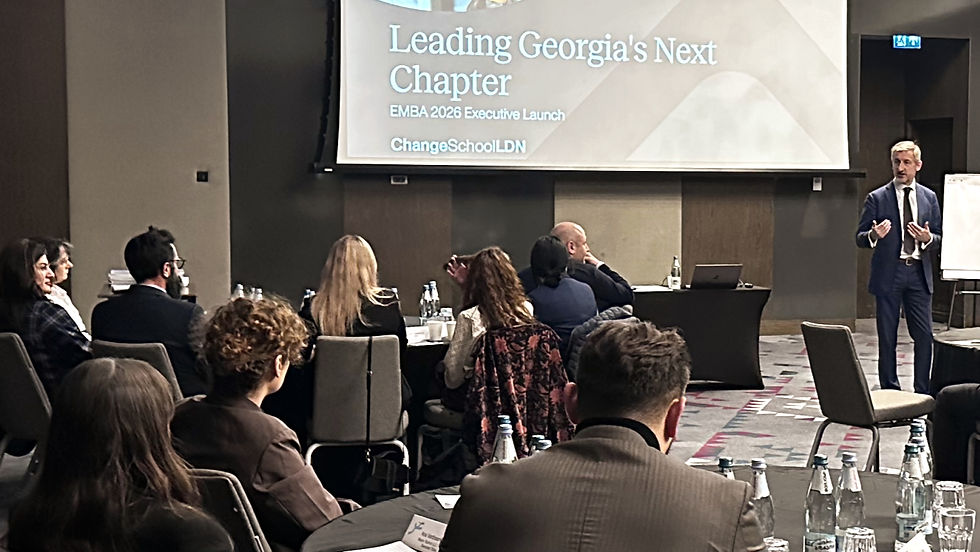Rethinking Rocket Growth: Full Speed Ahead
- Nov 25, 2025
- 5 min read
Recently, Viren Lall, ChangeSchool London MD, joined a remarkable group of practitioners, investors, and policymakers at The Entrepreneurs Network and Rigby Group plc roundtable to discuss how Britain can build stronger networks of start-up support programmes. The conversation, convened around their recent report Full Speed Ahead, was refreshingly candid about what isn't working in our ecosystem.
What made the session valuable wasn't any single insight but the honest acknowledgement from everyone in the room that we're facing a systems problem, not just a funding problem. Over 90 minutes of discussion, a pattern emerged: the challenges in UK accelerator provision aren't about lack of resources but about misaligned incentives, fragmented delivery, and fundamental questions we've avoided asking.

Not Every Business Needs Rocket Growth
One theme dominated the conversation: the assumption that all 860 incubators and accelerators across the UK should be optimised for high-growth ventures.
Not every business needs to become a unicorn. The world doesn't require that, and those markets don't exist at scale. Some ventures create meaningful value through steady growth. Others provide founders with the opportunity to work on their business in ways that corporate environments cannot accommodate.
Japan's ecosystem includes many such enterprises, where founders pursue their craft and build sustainable livelihoods without seeking exponential returns.
The critical question isn't whether we have too many programmes but whether we're honest about what different programmes are designed to achieve.
Some exist to convert job seekers into job creators, supporting economic activity in regions that need it. Others are explicitly designed to identify and accelerate high-potential ventures capable of attracting significant investment and scaling rapidly.
The problem emerges when we conflate these objectives. When funding bodies measure success by whether a company still exists three years later, rather than whether it's creating genuine enterprise value, we end up supporting zombie businesses. These ventures neither fail quickly nor grow meaningfully. They consume founder time, public resources, and market attention whilst delivering limited returns.
We need clearer thinking about healthy growth rates and opportunity costs. At what point is a founder's potential better served by pursuing employment rather than persisting with a marginal venture? This isn't a comfortable conversation, but it's necessary. The role of accelerators should include helping founders make this assessment, not simply encouraging persistence.
The Agency Problem: When Incentives Don't Align
The second major theme was the misalignment between what entrepreneurs need and what funding bodies incentivise.
Entrepreneurs should be focused on opportunity costs, competitive positioning, and building sustainable business models. Funding bodies, however, are often measured on deployment, job creation numbers, and whether companies remain registered at Companies House several years later. These metrics don't capture whether meaningful value is being created.
Several participants shared examples of regional programmes with substantial capital sitting undeployed because they couldn't identify businesses at the right stage. Meanwhile, founders in the same regions were cycling through multiple overlapping programmes, attending pitch events, and refining presentations rather than building products and validating markets.
The competitive landscape for accelerators creates perverse incentives. Programmes compete for press releases and corporate sponsorship renewals, not for long-term impact. As one contributor noted, you get a press release when you launch a corporate-backed programme, but not when you're delivering year five of patient, rigorous support.
The result is short-termism. The average life expectancy of a UK accelerator programme is less than 20 months. Once a programme closes, the data disappears. Nobody tracks what happened to the cohort, and companies rarely attribute their success to programmes they attended.
This creates a significant problem for evidence-based improvement. Investors often don't realise that businesses they back have been through accelerators because founders don't mention it, and investors don't ask. One venture capitalist interviewed for research claimed they never invested in accelerator graduates, yet all three of their most recent investments had completed at least two programmes.
The funding structure compounds this. The single largest source of accelerator funding in the UK comes from the Department for Communities and Local Government, distributed through local authorities. There's no single person responsible for this portfolio, no coordinated strategy, and no standard measurement framework.
Approximately one-third of programmes have no confirmed funding beyond this financial year. We're facing a potential collapse of capacity, and it has little relationship to programme quality.
The Systems Challenge: Fragmentation Without Coordination
The third persistent theme was fragmentation. Despite 860 programmes, or perhaps because of that number, there's insufficient coordination and quality benchmarking.
Multiple participants raised examples of duplication within single regions. Council-funded programmes are operating alongside corporate-backed accelerators, both targeting similar cohorts with similar offerings. Founders are bouncing between programmes rather than focusing on building their businesses. No systematic mechanism for helping founders understand which programme, if any, suits their needs and stage.
The regional challenge is particularly acute.
In London, network effects create natural quality benchmarks. Founders overhear conversations in coffee shops, attend events where experienced operators share hard-won lessons, and access mentors who challenge assumptions.
Outside London, particularly in post-industrial regions, these network effects don't exist. Founders don't know what they don't know. Programme managers, often well-meaning but lacking exposure to best practice, cannot provide the quality of challenge and validation that early-stage ventures need.
Wales was cited as a specific example: 70% of economic activity concentrated along a narrow corridor in the south, then vast rural areas, then a small concentration in the north. Creating connectivity and access to expertise in that geography is fundamentally different from the challenges in London. Yet funding structures and programme models often treat all regions as equivalent.
The loss of European Regional Development Fund support exacerbated this. ERDF had two significant advantages: three-year funding cycles that enabled programme continuity, and a standard national framework for measuring jobs created and investment raised. Despite its bureaucratic nature, it provided baseline data. Now we're flying blind, with no equivalent national measurement framework and no consistency in how programmes define or report outcomes.
The Take Away
The conversation surfaced something Viren has been thinking about for some time: the need for both more clarity about purpose and more honesty about outcomes.
Above-the-line thinking identifies which accelerators should explicitly focus on bringing high-growth ventures into tight-knit ecosystems designed for rapid scaling. Below-the-line thinking acknowledges that many programmes serve different purposes: creating economic activity, supporting regional employment, and enabling founders to build sustainable small businesses. Both are legitimate, but conflating them creates confusion and wastes resources.
The more difficult question is how we create systematic processes for identifying and supporting high-potential regional ventures. In this country, we cannot easily take the ecosystem to them. Can we bring them into the ecosystem instead? That requires not just programmatic support but pastoral care and candid mentorship, both for start-up hubs (helping them clarify mission and focus) and for founders (helping them recognise when pivoting, persisting, or stopping is the right choice).
The practitioners around the table brought deep experience and refreshing honesty about what isn't working. The challenges are substantial, but the willingness to name them is the first step towards addressing them.
The discussion reinforced a central point about capability building: transformation requires clarity about what success looks like, alignment of incentives, and honest feedback loops. Without these, even well-resourced programmes struggle to create lasting impact.
For the full "Full Speed Ahead" report from The Entrepreneurs Network and Rigby Group plc, which includes contributions from ChangeSchool, visit www.tenentrepreneurs.org/full-speed-ahead
Learn more about ChangeSchool's entrepreneurship education programmes designed for accelerators and high-growth ventures here
Be part of our growing community of innovators and leaders



